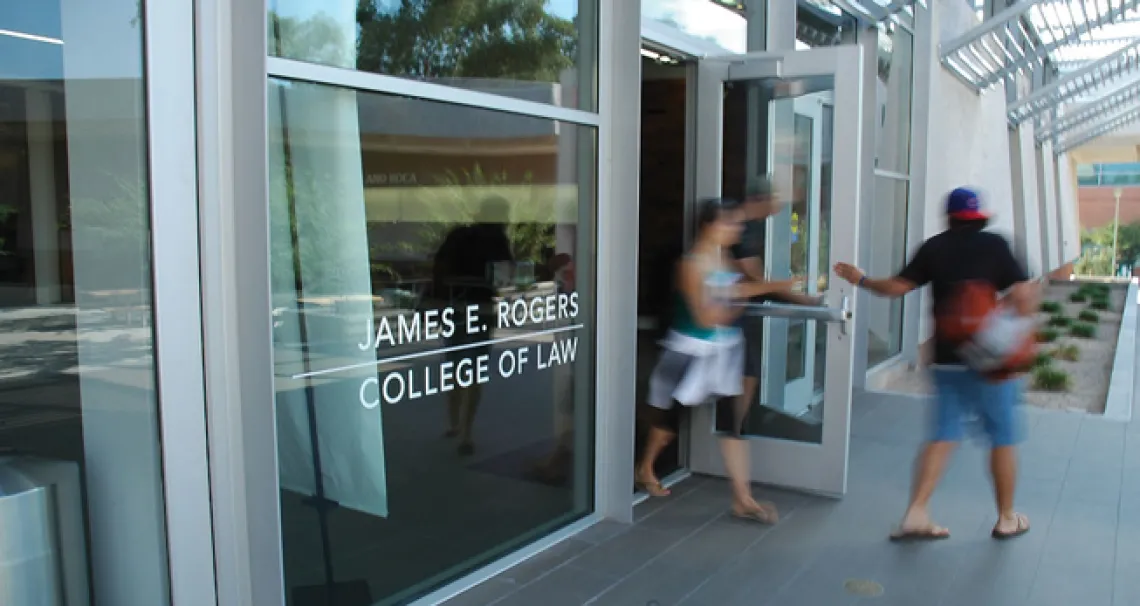Dean Miller Shares Vision for Admissions, GRE Applicants in Bloomberg Law Q&A

In the wake of University of Arizona Law announcing in February that it would begin accepting the GRE as an admissions test, the initiative has continued to gain national attention, along with support from deans at the majority of U.S. law schools.
On Saturday, May 7, the Law School Admissions Council (LSAC), the company that administers the Law School Admissions Test (LSAT), announced that Arizona Law can continue using its services to recruit and admit law school applicants. LSAC had previously said that Arizona Law's access may be revoked because of its GRE policy.
[Related: How to Apply with either the GRE or LSAT]
A May 5 letter to LSAC's president signed by 148 law school deans expressed strong support for Arizona Law and the use of the GRE, stating, "Experimentation benefits all of us. We all expect to learn from the University of Arizona’s experiment and it should not be punished by LSAC."
[Related: "Law School's Acceptance of GRE Test Scores Provokes Tussle" (New York Times) | "LSAT Maker Backs Away from Showdown With Arizona Law over GRE" (Wall Street Journal)]
Dean Marc Miller explained more about the college's rationale for allowing any applicant to apply with either a GRE or LSAT score and his vision for legal education in a Q&A with Bloomberg Law. Read excerpts below and see the full Q&A here.
Big Law Business: Tell us a bit about the decision to accept students who took the GRE.
Miller: At Arizona Law, one of our longstanding goals is to improve access to legal education for those we believe will find success and contribute to the profession.
We believe that law schools and the legal profession need a greater number of high-quality applicants with the widest range of life, educational, and professional backgrounds. Having only one admissions test as an access point automatically reduces that number and puts us out of line with every other profession and academic discipline, none of whose regulators require any standardized test for admission, much less a single test.
The ABA standard that regulates admissions testing doesn’t say that law schools must use the LSAT. It says law schools must use a valid and reliable standardized test “in assessing an applicant’s capability to satisfactorily complete the school’s program of legal education.” We participated in a study with Educational Testing Service (ETS) that proved just that, and therefore made the decision to accept the GRE or the LSAT as an admissions test for our JD program.
Big Law Business: Why is the LSAT not necessarily the most reliable metric for predicting law school success?
Miller: The LSAT has some predictive power regarding first-year law school grades, but nobody claims that it is a predictor of success in law school or, more fundamentally, a predictor of success as an attorney. Any valid and reliable test including (but not limited to) the LSAT and the GRE can be a useful guide for schools and students. But as colleges throughout the country have now widely recognized, these tests have been given far too much weight in admissions decisions and needs to be used in proper context rather than elevated above all else.
For law school admissions, we continue to analyze applicants using a number of tools, including undergraduate GPA, personal statement, references, leadership and work experience, military and other public service, and standardized test scores to determine if we think they will do well in law school, pass the bar exam, and succeed in the profession. Now we have an additional and widely available option for one of those tools.
Big Law Business: Does the support from other colleges around the nation indicate other colleges should also expand their applicant pool?
Miller: I hope that the GRE would be generalized for all U.S. law schools that want to use it in the shortest possible time. More generally I think the support indicates that legal education is ready for and enthusiastic about innovation and that people see the value in encouraging a legal education and career to those who may not have previously considered it, but who can be very successful. We live in a time of dramatic change for legal education and the legal profession, and in our view that change will continue and speed up.
